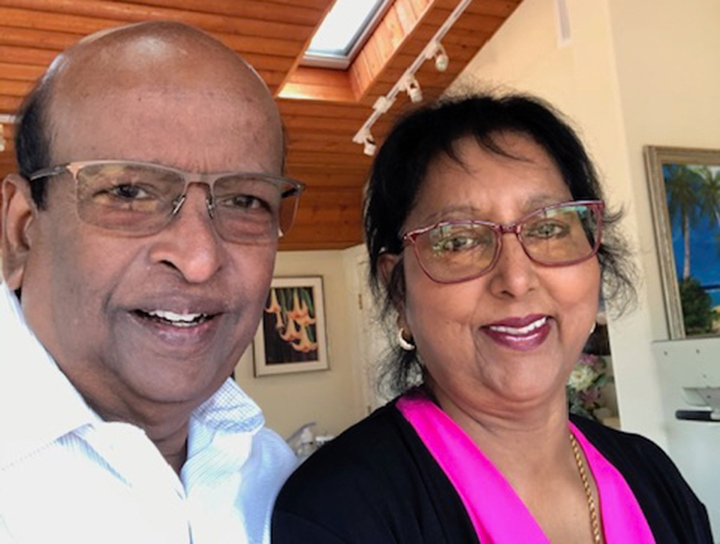Dr. Muthiyaliah and Rani Babu support KITP’s postdoctoral scholars

When you lay down in a field in remote India with no light pollution and look at the sky, that’s astrophysics. When Dr. Babu’s four-year-old grand-daughter asks him how far the sky goes, it’s biology. Dr. Muthiyaliah Babu has always been curious about what’s out there, a universal yearning for the unknown. He and his wife, Rani, (pictured below) have chosen to support postdoctoral scholars at KITP for the future of science and the future of their grandchildren.
When Dr. Babu first moved to Santa Maria, California, from Michigan, he would drive 150 miles to UCLA to attend conferences. Thankfully for him, a patient introduced him to KITP’s frequent public lectures. At his first one, Dr. Babu thought he had stumbled into a high-level physics lecture and was impressed with the intense cross-pollination of ideas.
“Medicine is a benefactor of curiosity,” said Dr. Babu, who sees medicine and physics as intertwined. “If not for NASA, we wouldn’t have telemetry. Radiotherapy drives the cancer field. These advances came out of curiosity.”
Over 600 curious scholars from the international physics community apply for just a few postdoctoral scholar positions at KITP each year. Scholars choose KITP because they know they’ll benefit from broad exposure to new ideas, expert mentorship and rare opportunities. Cross-pollination provides perspective and respect for other fields. As a result of their work at KITP, postdoctoral scholars often switch the focus of their research efforts.
Dr. Babu can relate with physicists who find new specialties at KITP. In 1972, Dr. Babu traveled from India to New York to become a thoracic surgeon. He left as a nephrologist, a kidney specialist. The transformative moment was a pie chart that showed the composition of ocean water and extracellular fluids. Dr. Babu was amazed to see they were the same.
“The ocean represents the primordial soup that we all came from as single-celled organisms,” said Dr. Babu. “Our body cannot survive without it. The kidney is responsible for maintaining its chemical content.”
Chemistry, engineering, even the quantum physics of Positron Emission Tomography (PET) scans: There is enormous interaction among all sciences. Next, Dr. Babu would like KITP to expand collaboration with the humanities.
“It’s all one field,” he said.
